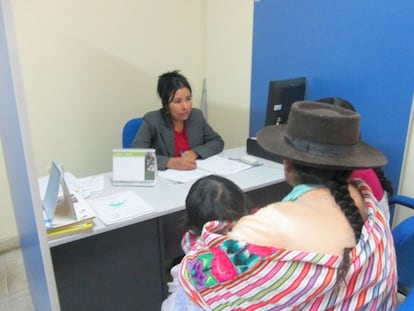Learning Quechua in Peru to better serve citizens across the country
Police are becoming well-versed in the second official language thanks to a new manual

Lawyer Wilfredo Ardito, who co-authored a handbook for the use of Quechua language in police stations, delivered his text to 120 school students at a police cadet school recently in the Andean city of Ayacucho as they sat in a makeshift auditorium. He asked them to translate some verbs and phrases, and most responded without error. Then he points to his tie: "How do you say blue?" "Bluuuuue," the students respond, laughing because they know that’s English but not Quechua, Peru’s second official language. Anqas is blue in Quechua.
"They think if they speak Quechua, people will discriminate against them. That is why the language is almost invisible. The only way for a language to become prestigious is when it is written or you see it on TV,” Ardito explained.
Ardito and Quechua-speaking researcher Gavina Córdova travel the mountainous department of Apurimac, in the south, interviewing police officers, state employees and parents to learn about the use of Quechua in daily life. According to the 2007 official census, Quechua is learned during childhood by 71.5 percent of the population of Apurimac who are more than five years old. The department is home to the largest percentage of Quechua speakers in the country.
"Our study found that police officers make themselves understood in the language. ‘I can speak it,’ they say, but I notice they were not well-versed in Quechua, so we came up with this manual,” the lawyer explained to EL PAÍS. "It's different to search for a missing child of eight who is wearing a green sweater than to search for one of four who has red clothes," he adds, explaining that puka, red in Quechua, is one of the most used words.
The manual has already been distributed among police stations in Apurimac and Cuzco departments
A pioneer in the field of teaching of Quechua, the manual has already been distributed among police stations in Apurimac and Cuzco departments (in Peru’s southern Andes), where the language is learned during childhood by 52 percent of the population of five and over, according to the 2007 census by the National Institute of Statistics and IT (INEI).
"In some remote places, a police station is the only governmental body. The police are there where authorities are not present. Sometimes if people tell citizens that they are going to take their home or son or daughter, they seek police guidance.
"Unlike the Basque Country, Catalonia and Quebec, where citizens are required to speak in their own language, the state sometimes provides a translator because there are some who are not proficient in Spanish. It is not seen as a prestigious language; even the few books that teach a few sentences must be adapted to modern teaching methods,” said the lawyer who is also a human rights advocate.
In Ayacucho, 63.9 percent of the population from the age of five reported in 2007 that they had learned Quechua in childhood. During one presentation of the manual, a representative of the ombudsman's office in Ayacucho, Jorge Fernández, said that according to the rules of administrative procedure, the state must pay services in the native language of the citizen.
"Most people who come here to file a complaint or seek guidance are Quechua speakers," says Fernández, pointing to a group of women who have just arrived at the office.
Recently the Lima daily El Comercio reported that one of the largest public hospitals in the capital opened a special office where physicians can receive patients who speak Quechua. Each month the hospital serves about 200 Quechua-speakers, according to the director of the Hospital Loayza, Zarela Solis.
Few public entities are currently receptive to Quechua speakers. The Peruvian Congress was one of the first to record a telephone greeting in Quechua. But this manual may make its way to other public bodies which want to introduce Quechua among their workers.
Tu suscripción se está usando en otro dispositivo
¿Quieres añadir otro usuario a tu suscripción?
Si continúas leyendo en este dispositivo, no se podrá leer en el otro.
FlechaTu suscripción se está usando en otro dispositivo y solo puedes acceder a EL PAÍS desde un dispositivo a la vez.
Si quieres compartir tu cuenta, cambia tu suscripción a la modalidad Premium, así podrás añadir otro usuario. Cada uno accederá con su propia cuenta de email, lo que os permitirá personalizar vuestra experiencia en EL PAÍS.
¿Tienes una suscripción de empresa? Accede aquí para contratar más cuentas.
En el caso de no saber quién está usando tu cuenta, te recomendamos cambiar tu contraseña aquí.
Si decides continuar compartiendo tu cuenta, este mensaje se mostrará en tu dispositivo y en el de la otra persona que está usando tu cuenta de forma indefinida, afectando a tu experiencia de lectura. Puedes consultar aquí los términos y condiciones de la suscripción digital.








































